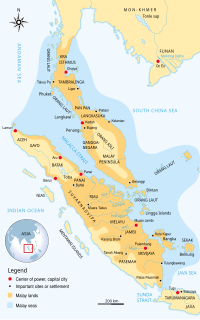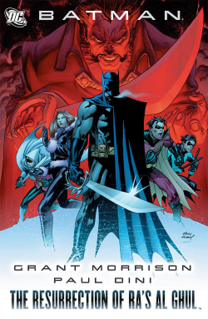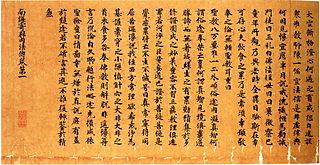This page is based on this
Wikipedia article Text is available under the
CC BY-SA 4.0 license; additional terms may apply.
Images, videos and audio are available under their respective licenses.

Nalanda was a Mahavihara, a large Buddhist monastery, in the ancient kingdom of Magadha in India. The site is located about 95 kilometres (59 mi) southeast of Patna near the city of Bihar Sharif, and was a centre of learning from the fifth century CE to c. 1200 CE. It is a UNESCO World Heritage Site.

The Golden Light Sutra or Suvarṇaprabhāsa Sūtra, also known by the Old Uygur title Altun Yaruq, is a Buddhist text of the Mahayana branch of Buddhism. In Sanskrit, the full title is The Sovereign King of Sutras, the Sublime Golden Light.

Gupta was the founder of the Gupta dynasty of northern India. He is identified with king Che-li-ki-to, who, according to the 7th century Chinese Buddhist monk Yijing, built a temple near Mi-li-kia-si-kia-po-no (Mṛgaśikhāvana) for Chinese pilgrims.
The Memoirs of Eminent Monks, also known as the Biographies of Eminent Monks, is a compilation of biographies of monks in China by Hui Jiao 慧皎 of Jiaxiang Temple in Kuaiji Mountain, Zhejiang circa 530 from the introduction of Buddhism to China up to the Liang Dynasty. Hui Jiao explains himself that the title is supposed to draw a contrast with monks who are famous but not eminent - an allusion to the lost work of his contemporary Baochang, Míngsēng zhuàn 名僧傳.
Steve Moore was a
British comics writer.

The Melayu Kingdom was a classical Southeast Asian kingdom.
The text Tài Xuán Jīng was composed by the Confucian writer Yang Xiong. The first draft of this work was completed in 2 BCE. During the Jin dynasty, an otherwise unknown person named Fan Wang salvaged the text and wrote a commentary on it, from which our text survives today.

"The Resurrection of Ra's al Ghul" is the name of an eight issue comic book crossover story arc published by DC Comics in 2007 and 2008. It involves the return of notable Batman villain Ra's al Ghul, and is his first appearance since his apparent death in "Batman: Death and the Maidens" in 2003. It also connects back to the "Batman and Son" storyline, which introduced Damian as the son of Batman and Talia al Ghul.
Indonesian Esoteric Buddhism or Esoteric Buddhism in Maritime Southeast Asia refers to the traditions of Esoteric Buddhism found in Maritime Southeast Asia which emerged in the 7th century along the maritime trade routes and port cities of the Indonesian islands of Java and Sumatra as well as in Malaysia. These esoteric forms were spread by pilgrims and Tantric masters who received royal patronage from royal dynasties like the Sailendras and the Srivijaya. This tradition was also linked by the maritime trade routes with Indian Vajrayana, Tantric Buddhism in Sinhala, Cham and Khmer lands and in China and Japan, to the extent that it is hard to separate them completely and it is better to speak of a complex of "Esoteric Buddhism of Mediaeval Maritime Asia." In many of the key South Asian port cities that saw the growth of Esoteric Buddhism, the tradition coexisted alongside Shaivism.

The Mūlasarvāstivāda was one of the early Buddhist schools of India. The origins of the Mūlasarvāstivāda and their relationship to the Sarvāstivāda sect still remain largely unknown, although various theories exist.
Edward Louis Shaughnessy is an American Sinologist, scholar, and educator, known for his studies of early Chinese history, particularly the Zhou dynasty, and his studies of the Classic of Changes .
Yijing was a Manchu prince of the Qing Dynasty. He was a nephew of the Daoguang Emperor. In 1826, he served at Kashgar as a junior officer in the campaign against Jahangir Khoja. During the First Opium War, after the British captured Zhenhai and Ningpo, the emperor ordered Yijing to go to Zhejiang on 18 October 1841 and take command of a counter-offensive. In the Battle of Ningpo on 10 March 1842, Yijing's troops attempted to retake the city, but the British successfully repelled the attack.
The 2012 Blossom Cup was a professional tennis tournament played on hard courts. It was the third edition of the tournament which was part of the 2012 ITF Women's Circuit. It took place in Quanzhou, China between 3 and 8 January 2012. It offered the prize of US$ 50,000.
Wen Wang Gua is a method of interpreting the results of I Ching divination that was first described in writing by Jing Fang in Han dynasty China. It is based on correlating trigrams to the Celestial Stems and Earthly Branches of the Chinese calendar, and then using the stem and branch elements to interpret the lines of the trigrams and hexagrams of the I Ching. The method is popular in South East Asia. It is known by various names: refers to the fact that it interprets the meaning of six symbols; the Najia method, indicates its logic of elemental values derived from the Chinese calendar; Wu Xing Yi ; or Wen Wang Ke.
Yijing Hexagram Symbols is a Unicode block containing the 64 hexagrams from the I Ching.

Yijing, formerly romanized as I-ching or I-tsing, was a Tang-era Chinese Buddhist monk famed as a traveller and translator. His account of his travels is an important source for the history of the medieval kingdoms along the sea route between China and India, especially Srivijaya in Indonesia. A student of the Buddhist university at Nālandā, he was also responsible for the translation of a large number of Buddhist texts from Sanskrit and Pali into Chinese.
Yijing or I Ching is a Chinese classic text.
Cheng I-ching is a Taiwanese table tennis player. She competed at the 2016 Summer Olympics in the women's singles event, in which she was eliminated in the quarterfinals by Li Xiaoxia, and as part of the Chinese Taipei team in the women's team event.







